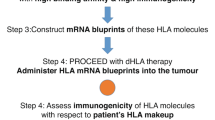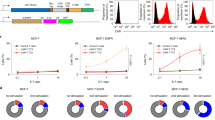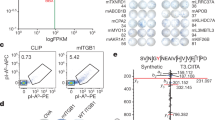Abstract
TRANSPLANTATION antigen-like tumour-associated surface membrane antigens (TATA) have now been prepared in solubilised or semi-solubilised form1–3. The methods of preparation are, however, complicated and yields are usually poor. Moreover, protection experiments with solubilised tumour antigens have rarely been successful and have given very limited protection1,2,4,5. On the other hand, all manner of devitalised cells protect in immunisation experiments against living tumour cells6; and it is therefore possible that interference with cell membrane integrity during solubilisation destroys tertiary and quaternary structures important for the immunogenicity of membrane antigens6,7. We describe here a simple and gentle procedure for preparing in near-quantitative yield (nucleated) tumour cell ‘ghosts’ with retention of protective immunogenicity. Freeze drying of ‘ghost’ suspensions provided a stable material which retained its protective activity for 2.5 yr when stored dry at 4 °C.
This is a preview of subscription content, access via your institution
Access options
Subscribe to this journal
Receive 51 print issues and online access
$199.00 per year
only $3.90 per issue
Buy this article
- Purchase on Springer Link
- Instant access to full article PDF
Prices may be subject to local taxes which are calculated during checkout
Similar content being viewed by others
References
Meltzer, M. S., Leonard, E. J., Rapp, H. J., and Borsos, T., J. natn. Cancer Inst., 47, 703 (1971).
Baldwin, R. W., and Glaves, D., Clin. exp. Immun., 11, 51 (1972).
Kedar, E., Aronov, A., Sulitzenau, D., Israel J. med. Sci., 9, 266 (1973).
Law, L. W., and Appella, E. Nature, 243, 83 (1973).
Holmes, E. C., Kahan, B. D., and Morton, D. C., Cancer, 25, 373 (1970).
Augustin, R., Nature, 224, 295 (1969).
Wolf, A., and Avis, P. J. G., Transplantation, 9, 18 (1970).
Ponder, E., J. exp. Biol., 18, 257 (1942); in The Cell, 2 (edit. by Brachet, J., and Mirsky, A. E.), (Academic, New York, 1961).
Dodge, J. T., Mitchell, C., and Hanahan, D. J., Archs Biochem. Biophys., 100, 119 (1962).
Wallach, D. F. H., and Ullrey, D., Biochim. biophys. Acta, 64, 526 (1964).
Emmelot, P., and Bos, C. J., Biochim. biophys. Acta, 59, 375 (1966).
Bos, C. J., and Emmelot, P., Int. J. Cancer, 4, 705 (1969).
Fitzpatrick, M. E., et al., Immunology, 12, 1 (1967).
West, C. R., and Augustin, R., in Cytology Automation (edit. by Evans, D. M. D.), 121 (Proc. second Tenovus Symp., Livingstone, 1970).
Augustin, R., West, C. R., Sparshott, S. M., and Chandradasa, K. D., in Immunity and Tolerance in Oncogenesis, 2 (edit. by Severi, L.), 931 (Perrugia University Press, Italy, 1970).
Winn, H. J., J. Immun., 86, 228 (1961).
Author information
Authors and Affiliations
Rights and permissions
About this article
Cite this article
DAVIES, I., NICKLIN, M. & AUGUSTIN, R. Protective tumour cell ghosts with intact membrane markers. Nature 256, 49–50 (1975). https://doi.org/10.1038/256049a0
Received:
Accepted:
Issue Date:
DOI: https://doi.org/10.1038/256049a0
Comments
By submitting a comment you agree to abide by our Terms and Community Guidelines. If you find something abusive or that does not comply with our terms or guidelines please flag it as inappropriate.



